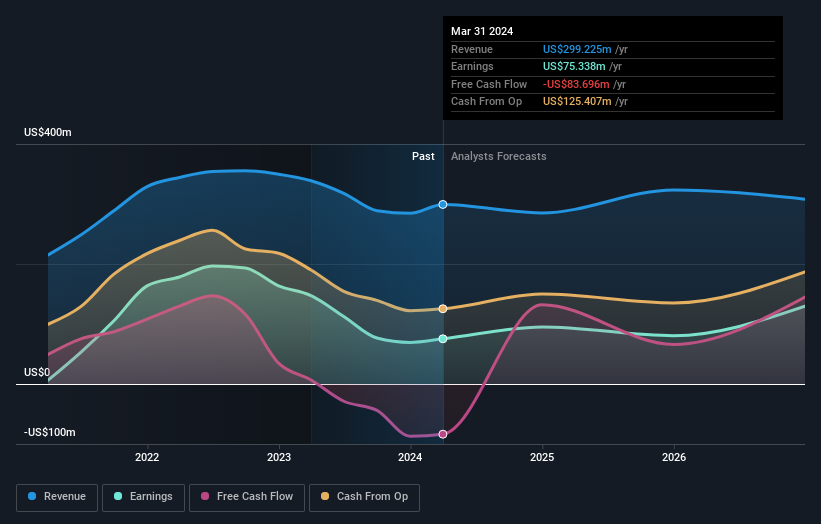Safe Bulkers, Inc.'s (NYSE:SB) largest shareholders are retail investors with 29% ownership, insiders own 27%
Key Insights
The considerable ownership by retail investors in Safe Bulkers indicates that they collectively have a greater say in management and business strategy
A total of 4 investors have a majority stake in the company with 52% ownership
Every investor in Safe Bulkers, Inc. (NYSE:SB) should be aware of the most powerful shareholder groups. We can see that retail investors own the lion's share in the company with 29% ownership. Put another way, the group faces the maximum upside potential (or downside risk).
Individual insiders, on the other hand, account for 27% of the company's stockholders. Large companies usually have institutions as shareholders, and we usually see insiders owning shares in smaller companies.
Let's delve deeper into each type of owner of Safe Bulkers, beginning with the chart below.
View our latest analysis for Safe Bulkers
What Does The Institutional Ownership Tell Us About Safe Bulkers?
Institutional investors commonly compare their own returns to the returns of a commonly followed index. So they generally do consider buying larger companies that are included in the relevant benchmark index.
We can see that Safe Bulkers does have institutional investors; and they hold a good portion of the company's stock. This implies the analysts working for those institutions have looked at the stock and they like it. But just like anyone else, they could be wrong. It is not uncommon to see a big share price drop if two large institutional investors try to sell out of a stock at the same time. So it is worth checking the past earnings trajectory of Safe Bulkers, (below). Of course, keep in mind that there are other factors to consider, too.
Hedge funds don't have many shares in Safe Bulkers. The company's CEO Polys Hajioannou is the largest shareholder with 27% of shares outstanding. In comparison, the second and third largest shareholders hold about 18% and 3.5% of the stock.
To make our study more interesting, we found that the top 4 shareholders control more than half of the company which implies that this group has considerable sway over the company's decision-making.
While it makes sense to study institutional ownership data for a company, it also makes sense to study analyst sentiments to know which way the wind is blowing. Quite a few analysts cover the stock, so you could look into forecast growth quite easily.
Insider Ownership Of Safe Bulkers
While the precise definition of an insider can be subjective, almost everyone considers board members to be insiders. The company management answer to the board and the latter should represent the interests of shareholders. Notably, sometimes top-level managers are on the board themselves.
Insider ownership is positive when it signals leadership are thinking like the true owners of the company. However, high insider ownership can also give immense power to a small group within the company. This can be negative in some circumstances.
Our information suggests that insiders maintain a significant holding in Safe Bulkers, Inc.. Insiders own US$171m worth of shares in the US$631m company. We would say this shows alignment with shareholders, but it is worth noting that the company is still quite small; some insiders may have founded the business. You can click here to see if those insiders have been buying or selling.
General Public Ownership
The general public, who are usually individual investors, hold a 29% stake in Safe Bulkers. While this size of ownership may not be enough to sway a policy decision in their favour, they can still make a collective impact on company policies.
Private Company Ownership
It seems that Private Companies own 18%, of the Safe Bulkers stock. Private companies may be related parties. Sometimes insiders have an interest in a public company through a holding in a private company, rather than in their own capacity as an individual. While it's hard to draw any broad stroke conclusions, it is worth noting as an area for further research.
Next Steps:
It's always worth thinking about the different groups who own shares in a company. But to understand Safe Bulkers better, we need to consider many other factors. Consider for instance, the ever-present spectre of investment risk. We've identified 3 warning signs with Safe Bulkers , and understanding them should be part of your investment process.
If you are like me, you may want to think about whether this company will grow or shrink. Luckily, you can check this free report showing analyst forecasts for its future.
NB: Figures in this article are calculated using data from the last twelve months, which refer to the 12-month period ending on the last date of the month the financial statement is dated. This may not be consistent with full year annual report figures.
Have feedback on this article? Concerned about the content? Get in touch with us directly. Alternatively, email editorial-team (at) simplywallst.com.
This article by Simply Wall St is general in nature. We provide commentary based on historical data and analyst forecasts only using an unbiased methodology and our articles are not intended to be financial advice. It does not constitute a recommendation to buy or sell any stock, and does not take account of your objectives, or your financial situation. We aim to bring you long-term focused analysis driven by fundamental data. Note that our analysis may not factor in the latest price-sensitive company announcements or qualitative material. Simply Wall St has no position in any stocks mentioned.
Have feedback on this article? Concerned about the content? Get in touch with us directly. Alternatively, email editorial-team@simplywallst.com

 Yahoo Finance
Yahoo Finance 

